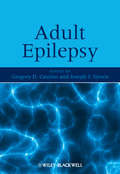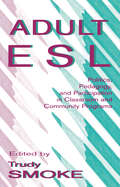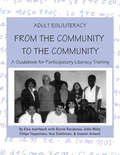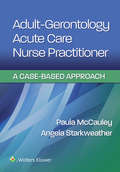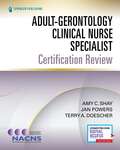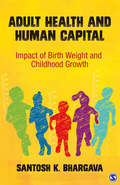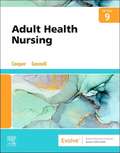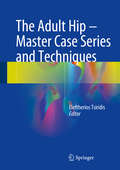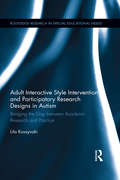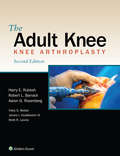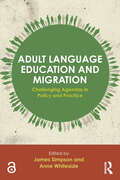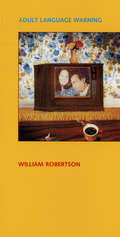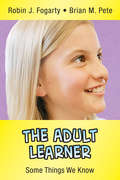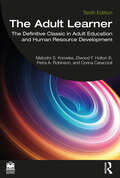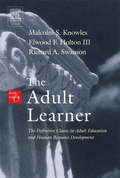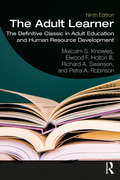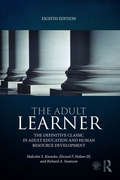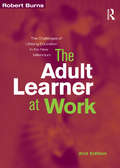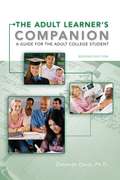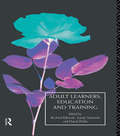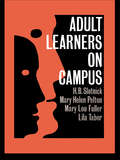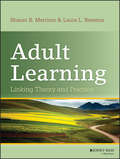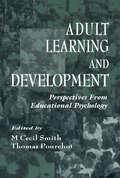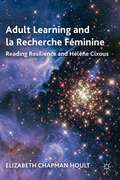- Table View
- List View
Adult Epilepsy
by Gregory Cascino Joseph SirvenDesigned to provide a comprehensive but accessible introduction to epilepsy and seizure disorders, Adult Epilepsy provides state-of-the-art information in a concise format useful to a wide audience, from neurology residents to epilepsy fellows and practitioners. This illustrated guide to the assessment, diagnosis, and treatment of epilepsy is a valuable resource enabling clinicians to stay on top of the latest recommendations for best practice.
Adult Esl: Politics, Pedagogy, and Participation in Classroom and Community Programs
by Trudy SmokeThe essays in this book focus on political strategies, pedagogical models, and community programs that enable adult ESL learners to become vital members of North American society. This is particularly important in our present time of contraction and downsizing in the education of non-native speakers. The authors represent a broad range of programs and perspectives, but they all have in common the goal of enabling both faculty and students to become full participants in our society and thereby to gain control over their futures. Readers of this book will develop an understanding of the ways in which innovative educators are creating strategies for maintaining language programs and services.
Adult ESL/Literacy From the Community to the Community: A Guidebook for Participatory Literacy Training
by Ana Zambrano Elsa Auerbach Byron Barahona Julio Midy Felipe VaqueranoAdult ESL/Literacy from the Community to the Community: A Guidebook for Participatory Literacy Training tells the story of a university-community collaboration to develop, implement, and evaluate a project designed to train immigrants and refugees as adult ESL and native literacy instructors in their own communities. Beyond the story of this one project, the book is also a clear and powerful explication of the underlying principles and premises of the program model it describes: community leadership development, a participatory approach to literacy instruction and instructor training, native language adult literacy instruction, and collaboration.
Adult-Gerontology Acute Care Nurse Practitioner: A Case-Based Approach
by Paula McCauleyAdult-Gerontology Acute Care Nurse Practitioner: A Case-Based Approach Studying for AGACNP/DNP certification, or looking to strengthen your adult-gerontology acute care skills? Grab the know-how, support, and practical guidance you need, with Adult-Gerontology Acute Care Nurse Practitioner. This clearly written, evidenced-based guide offers best practices for providing patient- and family-centered care for young adults, older adults, and elderly patients facing complex acute and/or chronic health conditions. From foundational advanced practice knowledge and skills to informed clinical judgment, this is an indispensable reference for preparing for AGACNP/DNP certification, and a clinical road map for all adult-gerontology acute care nurse practitioners.
Adult-Gerontology Clinical Nurse Specialist Certification Review
by Amy C. Shay Jan Powers Terry A. DoescherAdult Health and Human Capital: Impact of Birth Weight and Childhood Growth
by Dr Santosh K BhargavaToday when the world is looking towards India as a human resource capital, the quality of such resource becomes a global concern. This book studies the relation between aberrant growth, adult diseases, and human capital, and recommends growth monitoring as a tool for human capital development. The growth in the first two years after birth is crucial—it contributes to better schooling, adult stature, income generation, and birth weight in the next generation. The book shows that recognition of aberrant growth and timely intervention can combat not only childhood morbidity but also adult diseases such as diabetes, obesity, and hypertension, which can affect the next generation. The book refers to data from an ongoing cohort study, started in New Delhi in 1969, and finds that growth monitoring can have great intergenerational impact in India, where both childhood and adult morbidity are very high. Its contribution can be immense, given the impact on the future generation of Indians.
Adult Health Nursing
by Kim Cooper Kelly GosnellMaster the LPN/LVN’s role and responsibilities in medical-surgical nursing! With coverage organized by body systems, Adult Health Nursing, 9th Edition provides an essential guide to nursing care for patients with common disorders. Through use of the nursing process, you will develop clinical judgment skills to assess patient needs, develop nursing care plans, and plan effective nursing interventions. Case studies provide practice with critical thinking and clinical judgment, and new Next Generation NCLEX®-format questions help you apply theory to practice. Written by nursing educators Kim Cooper and Kelly Gosnell, this text also helps you prepare for success on the NCLEX-PN® examination. Step-by-step instructions for skills show clearly defined nursing actions along with the rationales for each. Overview of Anatomy and Physiology begins each body systems chapter, and the Introduction to Anatomy and Physiology chapter provides a clear, basic understanding of the A&P that LPN/LVNs need to know. The nursing process is applied to the discussion of disorders, and is summarized at the end of each chapter. Nursing care plans use a case-study format to emphasize patient goals and outcomes, and include critical thinking questions at the end of each care plan. Evidence-Based Practice boxes provide synopses of research articles that apply to nursing, along with nursing implications for the LPN/LVN. Safety Alert! boxes cover issues related to safe patient care in a variety of settings. Coordinated Care boxes promote comprehensive patient care with other members of the health care team, focusing on prioritization, assignment, supervision, collaboration, delegation, and leadership topics. Lifespan Considerations boxes provide age-specific information for the care of the patient. Older Adult Considerations boxes provide age-specific information for the care of the aging population, which is often the primary focus of the LPN/LVN nurse. Communication boxes illustrate communication strategies through real-life examples of nurse-patient dialogue. Patient Teaching boxes focus on three-way communication among the nurse, patient, and family members, and include topics such as hospital discharge instructions. Health Promotion Considerations boxes highlight information on wellness and disease prevention, including infection control, diet, and pregnancy. Home Health Considerations boxes discuss issues facing patients and their caregivers in the home setting. Medication tables provide quick access to action, dosage, precautions, and nursing considerations for commonly used drugs. Get Ready for the NCLEX® Examination sections provide key points, review questions, and critical thinking activities to reinforce learning. NEW! Next Generation NCLEX® case studies and new format questions help you prepare for success on the NCLEX-PN® examination. NEW! Discussion of the NCSBN Clinical Judgment Measurement Model helps you develop the skills needed to plan effective nursing interventions. NEW! Updated Immune Disorder and HIV/AIDS chapters highlight the newest medical and drug therapies. NEW! Updated photos and illustrations show nursing techniques, procedures, and patient care.
The Adult Hip - Master Case Series and Techniques
by Eleftherios TsiridisThis book is intended to offer a “virtual fellowship” in hip surgery that will give readers the opportunity to join distinguished hip surgeons in the operating room, learning key points and solutions to technical difficulties from the beginning to the end of 100 surgical cases. All of these cases have been carefully selected by renowned orthopaedists who work at the world’s top centers and perform surgery based on evidence. To facilitate quick learning, the cases are presented using a uniform template, guiding the reader from clinical evaluation and preoperative planning, through the decision-making process, to the surgical procedure and the final outcome. At the end of each case, the editor invites the surgeon to answer specific questions in order to further elucidate crucial issues with reference to current evidence. The book is divided into four sections: conservative hip surgery, primary hip arthroplasty, complex hip arthroplasty, and revision arthroplasty. It will be of value across the world to specialist hip surgeons and surgeons in training who are interested in hip surgery.
Adult Hydrocephalus
by Daniele RigamontiAdult hydrocephalus is an insidious yet treatable condition that develops slowly, with usual onset around 60 years of age. It is poorly recognized and many cases are not diagnosed until late in the course of disease, leading to poorer patient outcomes and a high financial cost to healthcare providers. The resulting neurological symptoms include gait/balance problems, loss of bladder control, and a cognitive decline leading to dementia, which is often mistaken for Alzheimer's disease. This book - the first published on this topic since 1993 - provides comprehensive guidelines to improve the speed and accuracy of diagnosis, and covers various neurosurgical techniques used to treat the disease, including the insertion of different types of shunts and endoscopic third ventriculostomy. This is essential reading for neurologists, neurosurgeons, family physicians, and radiologists who may well encounter adult patients with hydrocephalus more often than they realize.
Adult Interactive Style Intervention and Participatory Research Designs in Autism: Bridging the Gap between Academic Research and Practice (Routledge Research in Special Educational Needs)
by Lila KossyvakiRegardless of their cognitive and linguistic abilities, people with autism can often find it difficult to develop basic communicative skills that are necessary to gain full control over their environment and maintain their independence. Building on the author’s own cutting-edge research, Adult Interactive Style Intervention and Participatory Research Designs in Autism examines the impact that the interactive style of neurotypical individuals could have on the spontaneous communication of children with autism. This book provides clear and detailed guidance on how to conduct research into autism in real-world settings such as schools and homes. Kossyvaki critically evaluates a wealth of relevant case studies and focuses on a number of methodological issues that researchers are likely to face when carrying out research of this complex nature. The author walks the reader through present literature on the importance of spontaneous communication and the atypical way that this tends to develop in autism, before bringing the results of her own research to bear on the question of how the interactive styles of neurotypical individuals can impact on the spontaneous communication of people with autism. Adult Interactive Style Intervention and Participatory Research Designs in Autism is essential reading for academics, researchers, and postgraduate students in the fields of special educational needs, inclusion, autism, research methods, and educational and clinical psychology.
The Adult Knee
by Harry E. RubashAs knee replacement surgeries continue to grow in number worldwide, the need for an authoritative and comprehensive reference in this key area is a must for today’s orthopaedic surgeon. The Adult Knee: Knee Arthroplasty, Second Edition, brings together the knowledge and expertise of internationally recognized experts in the field in one convenient volume.
Adult Language Education and Migration: Challenging agendas in policy and practice
by James Simpson Anne WhitesideAdult Language Education and Migration: Challenging Agendas in Policy and Practice provides a lively and critical examination of policy and practice in language education for adult migrants around the world, showing how opportunities for learning the language of a new country both shape and are shaped by policy moves. Language policies for migrants are often controversial and hotly contested, but at the same time innovative teaching practices are emerging in response to the language learning needs of today’s mobile populations. This book: analyses and challenges language education policies relating to adult migrants in nine countries; provides a comparative study with separate chapters on policy and practice in each country; focuses on Australia, Canada, Spain (Catalonia), Finland, France, Ireland, the Netherlands, the UK and the US. Adult Language Education and Migration is essential reading for practitioners, students and researchers working in the area of language education in migration contexts.
Adult Language Warning
by William RobertsonAt the time of writing this book, William Robertson was a homemaker. His poems bring a new passion to the ancient domestic scene, and to everything else he looks at out of that often-turbulent centre. He ventures with care "into a swelling sea/ of silted meanings" equipped with his own elegant flexible vernacular, shaped precisely to the task of lighting up the trials and wonders of ostensibly ordinary days. These poems ring like crystal-hard edges of a tender heart.
The Adult Learner: Some Things We Know
by Robin J. Fogarty Brian M. PeteDiscover strategies that work with the adult learner!Based on the authors' 20 years of combined experience, this illuminating text examines the challenge of teaching adults and reveals what really works when leading professional development training for educators. Ideal for new and aspiring staff developers, this resource presents research-based adult learner theory and reviews assumptions about adult learners, principles that guide adult learning practices, and adult responses to change. The authors discuss all aspects of adult training, including:Roles people play in group processesThe three-tiered change processThe evolution of professional development modelsLevels of information transfer to the classroom
The Adult Learner: The Definitive Classic in Adult Education and Human Resource Development
by Malcolm Knowles Elwood F. Holton III Petra A. Robinson Corina CaraccioliHow do you tailor education to the learning needs of adults? Do they learn differently from children? How does their life experience inform their learning processes? These were the questions at the heart of Malcolm Knowles’ pioneering theory of andragogy which transformed education theory in the 1970s. The resulting principles of a self-directed, experiential, problem-centred approach to learning have been hugely influential and are still the basis of the learning practices we use today.Understanding these principles is the cornerstone of increasing motivation and enabling adult learners to achieve. The 10th edition of The Adult Learner has been revised to include:The two chapters on diversity, inclusion and belonging in adult learning, and andragogy and the online adult learner have been greatly expanded to reflect the importance of these topics to the field today.The accompanying Instructor and Student Resources website provides free digital materials designed to enhance student learning and save instructors time when preparing lessons. Resources include:• Ready-to-use PowerPoint slides to save instructor time when planning lessons• Learning objectives and part outlines for structured learning• Suggested class discussions, exercises, and scenario-based activities• Downloadable instruments for chapters 19 to 22• Video explaining the Andragogy In Practice model• A chapter-by-chapter Instructor Manual and a corresponding Student Guide to enhance learning outcomes.If you are a researcher, practitioner, or student in education, an adult learning practitioner, training manager, or involved in human resource development, this is the definitive book in adult learning you should not be without.
The Adult Learner
by Malcolm S Knowles Elwood F Holton III Richard A SwansonThis much acclaimed text has been fully updated to incorporate the latest advances in the field. As leading authorities on adult education and training, Elwood Holton and Dick Swanson have revised this edition building on the work of the late Malcolm Knolwes.Keeping to the practical format of the last edition, this book is divided into three parts. The first part contains the classic chapters that describe the roots and principles of andragogy, including a new chapter, which presents Knowles’ program planning model. The second part focuses on the advancements in adult learning with each chapter fully revised updated, incorporating a major expansion of Androgogy in Practice. The last part of the book will contain an updated selection of topical readings that advance the theory and will include the HRD style inventory developed by Dr. Knowles.This new edition is essential reading for adult learning practitioners and students and HRD professionals. It provides a theoretical framework for understanding the adult learning issues both in the teaching and workplace environments.
The Adult Learner: The Definitive Classic in Adult Education and Human Resource Development
by Malcolm S. Knowles Elwood F. Holton III Richard A. Swanson Petra A. RobinsonHow do you tailor education to the learning needs of adults? Do they learn differently from children? How does their life experience inform their learning processes? These were the questions at the heart of Malcolm Knowles’ pioneering theory of andragogy which transformed education theory in the 1970s. The resulting principles of a self-directed, experiential, problem-centred approach to learning have been hugely influential and are still the basis of the learning practices we use today. Understanding these principles is the cornerstone of increasing motivation and enabling adult learners to achieve. The 9th edition of The Adult Learner has been revised to include: Updates to the book to reflect the very latest advancements in the field. The addition of two new chapters on diversity and inclusion in adult learning, and andragogy and the online adult learner. An updated supporting website. This website for the 9th edition of The Adult Learner will provide basic instructor aids. For each chapter, there will be a PowerPoint presentation, learning exercises, and added study questions. Revisions throughout to make it more readable and relevant to your practices. If you are a researcher, practitioner, or student in education, an adult learning practitioner, training manager, or involved in human resource development, this is the definitive book in adult learning you should not be without.
The Adult Learner: The definitive classic in adult education and human resource development
by Richard Swanson Elwood Holton Malcolm KnowlesHow do you tailor education to the learning needs of adults? Do they learn differently from children? How does their life experience inform their learning processes? These were the questions at the heart of Malcolm Knowles’s pioneering theory of andragogy which transformed education theory in the 1970s. The resulting principles of a self-directed, experiential, problem-centered approach to learning have been hugely influential and are still the basis of the learning practices we use today. Understanding these principles is the cornerstone of increasing motivation and enabling adult learners to achieve. This eighth edition has been thoughtfully updated in terms of structure, content, and style. On top of this, online material and added chapter-level reflection questions make this classic text more accessible than ever. The new edition includes: Two new chapters: Neuroscience and Andragogy, and Information Technology and Learning. Updates throughout the book to reflect the very latest advancements in the field. A companion website with instructor aids for each chapter. If you are a researcher, practitioner or student in education, an adult learning practitioner, training manager, or involved in human resource development, this is the definitive book in adult learning that you should not be without.
Adult Learner at Work: The challenges of lifelong education in the new millenium
by Robert BurnsKnowledge is one of today's few meaningful resources. Equip yourself to ride the rollercoaster of racing change, globalism and technological super-innovation that is life and work in our age.Completely revised and updated for the 2000s, The Adult Learner at Work, 2nd edition is for educators, trainers and managers who want to stay in touch with the latest thinking in their fields. Dr Robert Burns explains the important changes that have swept through the field of post-compulsory education and the worldwide swing to the lifelong learning as the gateway to a learning society. When work, education and life satisfaction can truly intermesh, sustainable prosperity becomes achievable. Robert Burns explores such questions as:* What conditions have created lifelong learning, learning societies and learning organisations?* How have government and business responded?* What methods and processes enhance the learning potential of adults?* How can we motivate adults to learn?* What are the effects of advancing age on our ability to learn?* Is competency training an effective tool for encouraging learning?This new edition examines how and why we must facilitate the learning potential of all members of society. The Adult Learner at Work, 2nd edition provides an attractive vision of the development of learning environments in the workplace and the community setting-integrating skill learning and personal development using well founded principles of adult learning.
The Adult Learner's Companion: A Guide for the Adult College Student (Second Edition)
by Deborah Davis<p>Adult learners face unique challenges--work, family, and the numerous responsibilities and obligations that they must juggle while pursuing a degree. With limited time and financial resources, adult learners need to know where and how to get help quickly and easily, and who to turn to when they have questions. <p>The second edition of THE ADULT LEARNER'S COMPANION: A GUIDE FOR THE ADULT COLLEGE STUDENT preserves the principal core of the first edition while extending the scope and relevance of the relationship between life experience and its practical application to college and work. Essentially, the new edition teaches adult students how what they already know can be applied to all facets of college and career. <p>Author Deborah Davis, a former adult student herself, provides a concise manual that helps adult learners navigate their way through the college experience, while providing the skills necessary for academic achievement.</p>
Adult Learners, Education and Training
by Richard Edwards Sandy Sieminski David ZeldinFirst Published in 1992. Routledge is an imprint of Taylor & Francis, an informa company.
Adult Learners On Campus
by H.B. Slotnick Mary Helen Pelton Mary Lou Fuller Lila TaborThe opportunity for a "second chance" is a growing phenomenon. Some members of the Adult Learners Consulting Group, a dozen or so faculty and graduate students at the University of Dakota, who have a general interest in the related processes of learning and teaching, investigated the specific concern about the ways older-than-average students learn and the instructional methods most appropriate for them. They recognized that for both the older student and the teacher of the older student there are problems and issues that are different from the average student or student/teacher relationship. In addition to presenting an integrated picture of adult learners on campus, this book also provides some teaching techniques that can be used in the classroom tomorrow.; It is aimed at teachers in further and adult education, trainers in all disciplines, researchers in adult and continuing education.
Adult Learning: Linking Theory and Practice
by Sharan B. Merriam Laura L. BieremaSolidly grounded in theory and research, but concise and practice-oriented, Adult Learning: Linking Theory and Practice is perfect for master's-level students and practitioners alike. Sharan Merriam and Laura Bierema have infused each chapter with practical applications for instruction which will help readers personally relate to the material. The contents covers:Adult Learning in Today's WorldTraditional Learning TheoriesAndragogySelf-Directed LearningTransformative LearningExperience and LearningBody and Spirit in LearningMotivation and LearningThe Brain and Cognitive FunctioningAdult Learning in the Digital AgeCritical Thinking and Critical PerspectivesCulture and ContextDiscussion questions and activities for reflection are included at the end of each chapter.
Adult Learning and Development: Perspectives From Educational Psychology (Educational Psychology Series)
by M. Cecil Smith Thomas PourchotAdult education occurs whenever individuals engage in sustained, systematic learning in order to affect changes in their attitudes, knowledge, skills, or belief systems. Learning, instruction, and developmental processes are the primary foci of educational psychology research and theorizing, but educational psychologists' work in these domains has centered primarily on the childhood and adolescent school years. More recently, however, a number of educational psychologists have studied learning and development in adulthood. The results of these efforts have resulted in what is now called adult educational psychology. The purpose of this volume is to introduce this new subfield within educational psychology. Section 1 focuses on the interplay between learning and development in adulthood, how various forms of instruction lead to different learning outcomes for adults, description of the diverse social contexts in which adult learning takes place, and the development of metacognitive knowledge across the life span. Section 2 describes both research and theory pertaining to adult intellectual functioning, thinking, and problem-solving skills within various contexts. Section 3 describes research in a variety of adult learning domains; discusses the cognitive and behavioral dimensions of reading in adulthood and the applications of reading in real-life circumstances; examines an educational intervention developed to promote forgiveness; and relates the outcomes of an intervention designed to educate parents about their children's mathematics learning. Section 4 summarizes the themes and issues running throughout this, the first book that has sought to span the gulf between adult education, adult development, and educational psychology.
Adult Learning and la Recherche Féminine: Reading Resilience and Hélène Cixous
by Elizabeth Chapman HoultUsing Hélène Cixous' notion of 'l'écriture féminine' as an analogy for transformational learning and an investigative tool, Hoult explores why some adult learners are able to survive and thrive in the education system, despite facing significantly more challenges than the average student.
